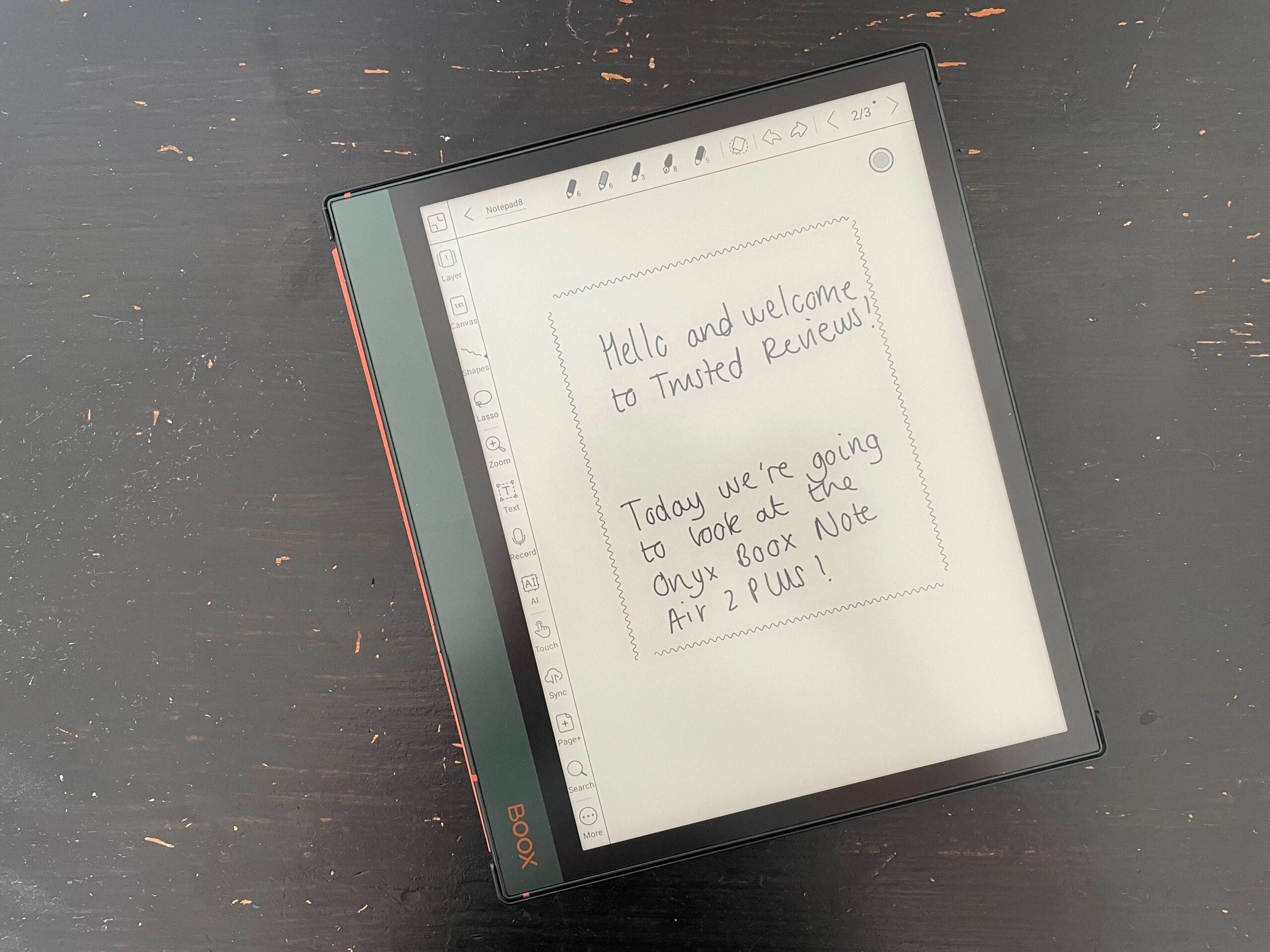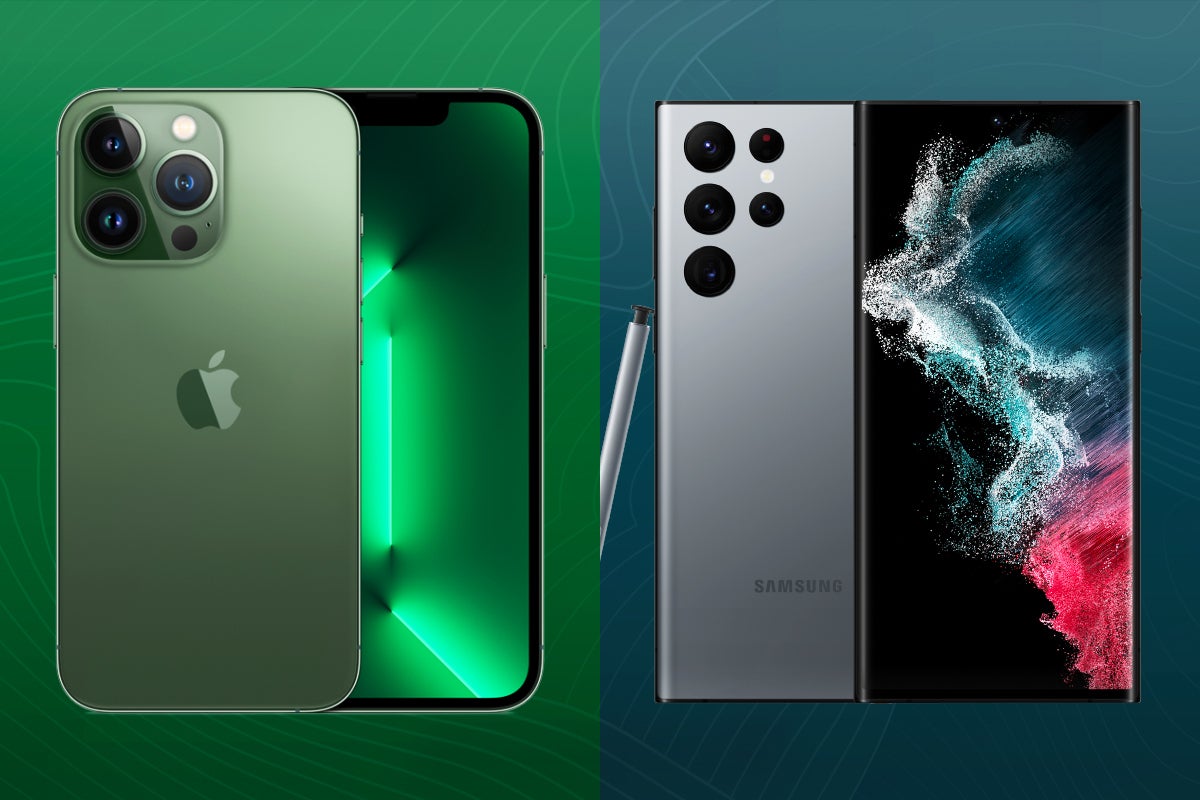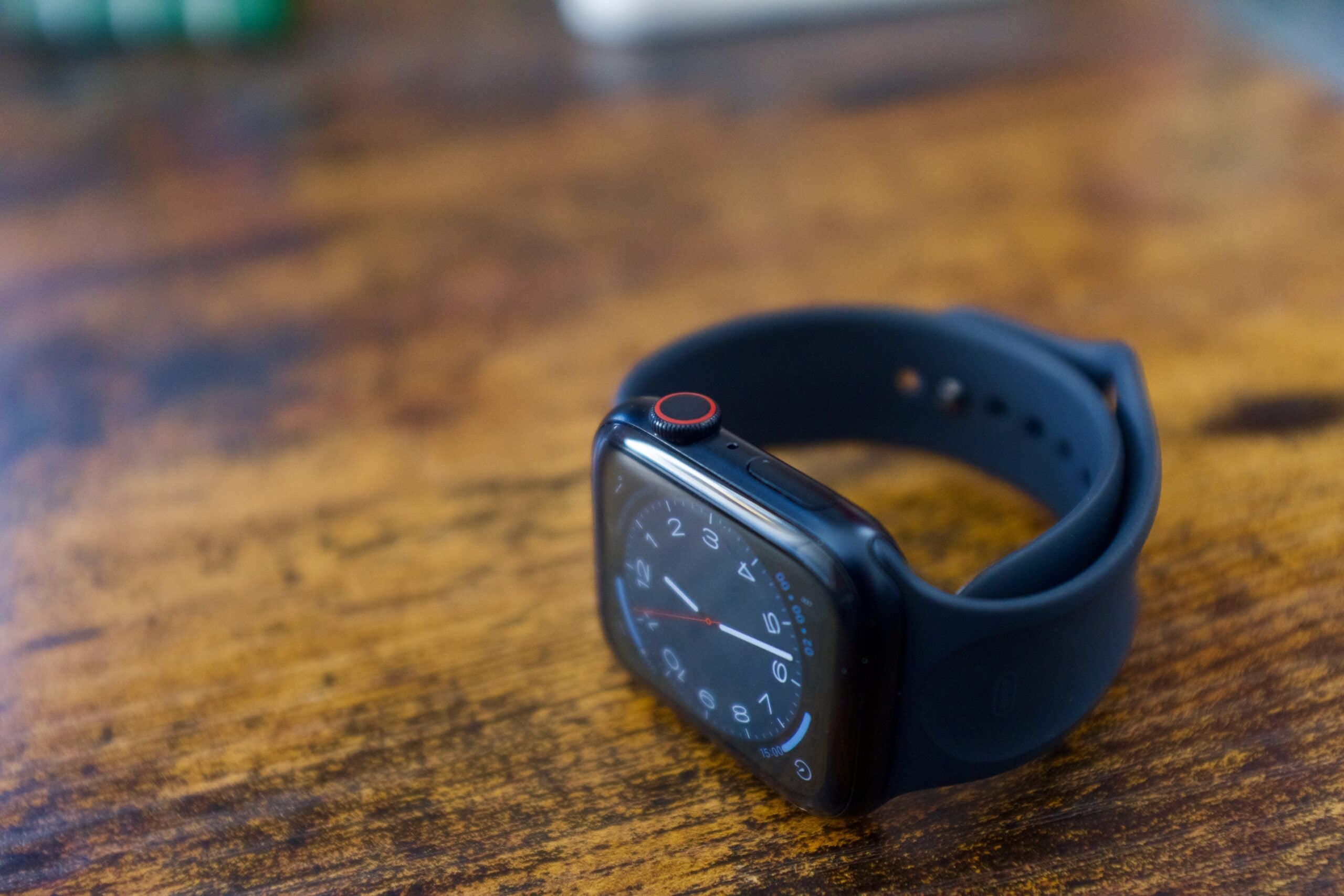Best E-Ink Tablet 2024: Our top four paper-like devices, rated and reviewed

E-ink tablets offer incredible functionality that traditional tablets simply can’t achieve, but which are actually worth your hard-earned cash?
While the latest iPads and Samsung Galaxy tablets have paved the way for creating a laptop-like experience from these portable slabs, there’s a growing appreciation for tablets that do away with high-end OLED panels in favour of less power-hungry, yet more comforting on the eye, E-Ink displays.
Made popular by e-readers like the Amazon Kindle range, E-Ink screens can project images with the same clarity as if reading ink on paper, which makes them great for less intensive tasks. With the surge in E-Ink tablets however, these devices are brilliantly suited for taking notes with bundled styluses, and annotating documents.
If you’re still on the fence over what type of tablet you fancy investing in then you can check out our best tablet and best budget tablet round-ups. Otherwise, keep reading to see which E-Ink tablets came out on top.
Best E-Ink Tablets at a glance:
- Best overall: Remarkable 2 – check price
- Most feature-packed: Onyx Boox Tab Ultra – check price
- Best for reading: Kobo Elipsa 2E – check price
- Best for Kindle books: Kindle Scribe – check price
How we test
One of our product experts has properly tested every tablet on this list and used it for an extended period of time. We categorically do not recommend a product unless it has been put through our lab tests and used by the reviewer as their main tablet for at least five days.
When a device is sent in for review with optional extras, such as a stylus and keyboard cover, we’ll assess its performance both as a standalone product as well as with any accompanying peripherals.
- Distraction free writing experience
- Simple but elegant UI
- Large screen that’s easy to read in good conditions
- Limited feature set compared to the competition
- Very expensive when accessories are in the mix
- No backlight to speak of
- Full access to the Google Play Store
- Fast performance in spite of its e-ink technology
- Writing is smooth and fluid
- The keyboard accessory makes sense here
- The UI lacks the simplicity of the Remarkable 2
- Accompanying app needs some work
- Extensive file support
- Dropbox, OverDrive and Pocket support
- Powerful handwriting recognition
- Ability to annotate your eBooks
- Performance isn’t amazing
- Not as premium-feeling as Kindle
- Odd unresponsiveness bug
- Stylus needs charging separately
- Great to write on
- Pen included
- Sharp display
- The software is lacking
- No handwriting recognition
- Sharing notes is tricky and limited

Remarkable 2
Best overall
Pros
- Distraction free writing experience
- Simple but elegant UI
- Large screen that’s easy to read in good conditions
Cons
- Limited feature set compared to the competition
- Very expensive when accessories are in the mix
- No backlight to speak of
If you’re in need of a distraction-free note-taking experience then the Remarkable 2 is a worthy upgrade from pen and paper.
Although its 10.3-inch display is sharp and boasts an 1872 x 1404 resolution, it’s worth highlighting that there isn’t a backlight which means you won’t be able to use the device if there isn’t a light source nearby.
With this in mind, night owls may be better served with a backlight fitted e-ink device, such as the Onyx Boox Note Air 2 Plus.
Thanks to its clear user interface, the Remarkable 2 is undeniably intuitive to use as you can find all the options you need right on the homepage, including the useful Quick Sheets page for in-the-moment note-taking.
We found the overall writing experience to be one of the best we’ve tried, as there was no noticeable delay in seeing your writing appear on screen, plus the paper-like display helped to recreate the feeling of writing in a traditional notebook.
Although some of the pen styles do offer colour, this can only be seen in the Remarkable app as the Remarkable 2’s display is monochrome. For general note-taking this shouldn’t be too much of an issue, however if you plan on creating digital art then you may be better suited to a tablet, such as the iPad Pro M4 or Galaxy Tab S9.
To get the most out of the Remarkable 2, you will need to invest in a separately sold pen and keyboard case. We found the best accessories were the Marker Plus and Type Folio keyboard case which would set you back a total £587/$627/€677 RRP (including the Remarkable 2 device itself.)
On top of that, there’s the optional Connect subscription for £2.99/$2.99/€2.99 a month, which gives you unlimited cloud storage and access to the Remarkable app. The monthly commitment alongside the device and accessories means this certainly isn’t the most budget-friendly offering.
If you’re looking for the most natural and distraction-free e-writing experience then we would seriously recommend the Remarkable 2. However if you’re on a tighter budget, plan on using the device for creating art or you work best in the dark, then you should consider other options.
Reviewer: Thomas Deehan
Full review: Remarkable 2 Review
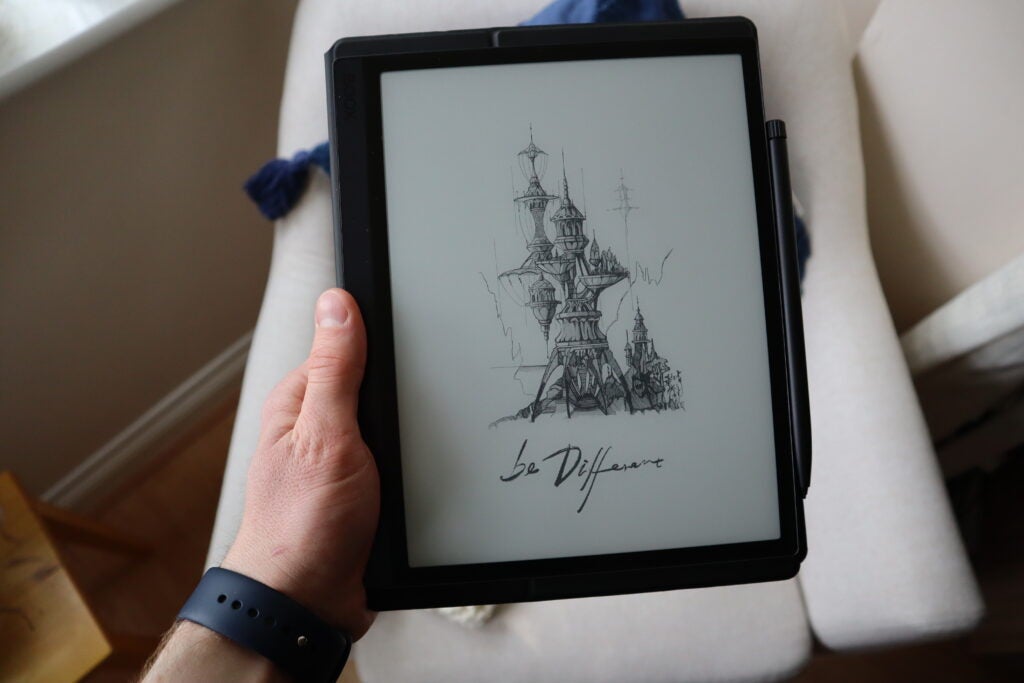
Onyx Boox Tab Ultra
Most feature-packed
Pros
- Full access to the Google Play Store
- Fast performance in spite of its e-ink technology
- Writing is smooth and fluid
- The keyboard accessory makes sense here
Cons
- The UI lacks the simplicity of the Remarkable 2
- Accompanying app needs some work
While the Remarkable 2 might be lacking a fair amount of smart features, the Onyx Boox Tab Ultra suffers from no such problem. By all standards, this is a fully-fledged Android tablet that just happens to feature an E-Ink display.
Running full Android 11, the Tab Ultra has complete access to the Google Play Store and all the apps within it, so in addition to the stock Onyx apps for note-taking and drawing, you also have the ability to read books in the Kindle app, listen to audiobooks via Audible and, if you just want to see what videos looks like on an E-Ink display, dive into a spot of YouTube.
The Tab Ultra is so feature-packed that no other E-Ink tablet on this list comes close. With the included stylus and optional keyboard case, the Ultra can be used as a genuine productivity machine that’s easier on the eyes than a laptop.
The accompanying app isn’t quite as intuitive as Remarkable’s, but what’s really impressive is just how fast the screen is able to refresh itself. Handwritten notes appear with unbelievable speed that we previously didn’t think was possible with E-Ink technology, so the Tab Ultra deserves recognition for really pushing the bar on what’s possible here.
For all that power however, the Tab Ultra does come with a hefty price tag that isn’t too far off the price of an iPad Air, so it’s really up to the user to decide if they value an E-Ink screen above all else when deciding which tablet to buy.
Reviewer: Thomas Deehan
Full review: Onyx Boox Tab Ultra Review

Kobo Elipsa 2E
Best for reading
Pros
- Extensive file support
- Dropbox, OverDrive and Pocket support
- Powerful handwriting recognition
- Ability to annotate your eBooks
Cons
- Performance isn’t amazing
- Not as premium-feeling as Kindle
- Odd unresponsiveness bug
- Stylus needs charging separately
If you like the idea of an e-ink tablet with wide e-book file support and great handwriting features but don’t quite have enough cash for the Onyx Boox Ultra, the Kobo Elipsa 2E is a more budget-friendly option.
While it stops short of offering the full Android ecosystem of apps from Google Play, the e-ink tablet does offer support for multiple e-book file types – 15 of the suckers, in fact – and you can even import files from Dropbox and Google Drive, as well as articles via Pocket. There’s even support for OverDrive in the UK, allowing you to rent eBooks from participating libraries free of charge.
The only catch is that it doesn’t support the Kindle Store, so if you’ve got a large library of Kindle books, you may have to look elsewhere.
If you’re yet to commit to Amazon’s ecosystem, however, there’s a lot to appreciate about the Elipsa 2E. It’s lighter than the Amazon Scribe and while both offer handwriting capabilities, the Elipsa 2E’s stylus offers additional functionality like an eraser on the tip and a button to quickly switch to a different style of pen. The handwriting recognition is way better on the Elipsa 2E, making it a doddle to convert hand-written notes to digital documents.
The only caveat is that Kobo’s e-book offering isn’t quite as vast as Amazon’s, nor are the recommendations as helpful as those on a Kindle. It’s fine if you’ve got a library of eBooks stored on Dropbox or Google Drive, but eBook discovery can be a little challenging.
Reviewer: Jon Mundy
Full review: Kobo Elipsa 2E Review
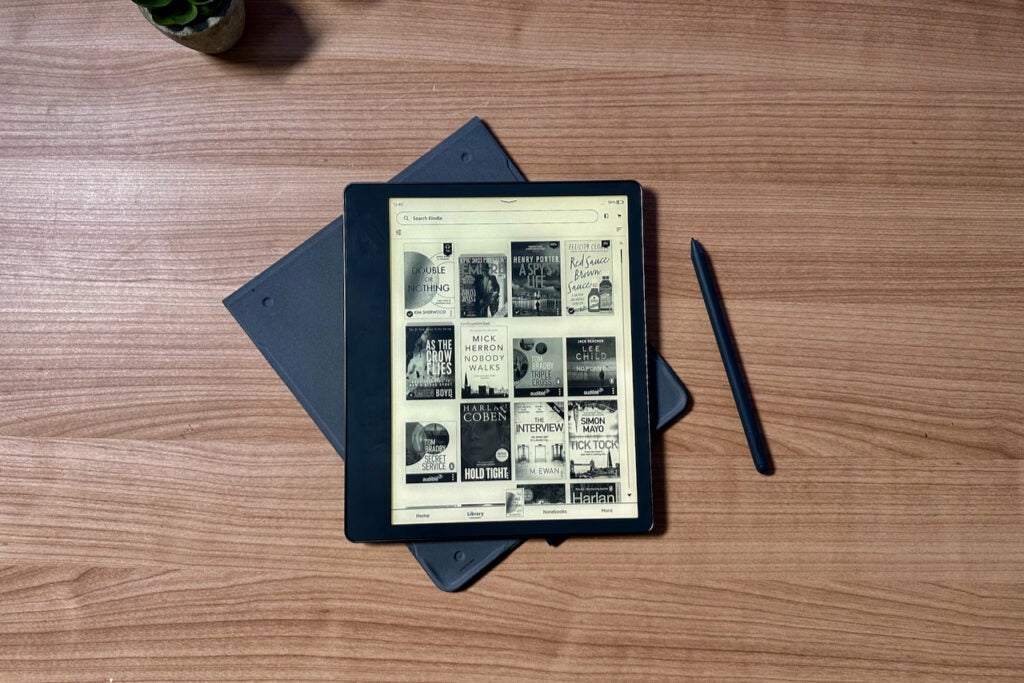
Amazon Kindle Scribe
Best for Kindle books
Pros
- Great to write on
- Pen included
- Sharp display
Cons
- The software is lacking
- No handwriting recognition
- Sharing notes is tricky and limited
Amazon’s first attempt at an E-Ink tablet might not be as seamless as the Remarkable 2 or as powerful as the Onyx Boox Tab Ultra, but it does have several things going for it, namely its integration with the Amazon Kindle library.
There’s no denying that Amazon’s collection of Kindle books leads the way in terms of e-book retailers, so the Kindle Scribe benefits from having one of the best reading experiences out there on an E-Ink tablet.
What separates the Scribe from other Kindles however is the included stylus which allows you to scribble down whatever your heart desires in the notebook section of the device. The included stylus feels great and Amazon’s absolutely nailed the sensation of pen to paper writing, but there are some limitations at play.
For starters, you can’t write directly on a page in a Kindle book – instead you have to jot down your thoughts in a little sticky note which is then signposted thereafter with a small icon on the page. It feels like such a missed opportunity, particularly as it’s exactly the kind of feature that people would want from this type of device, and one can only hope that Amazon rectifies the issue in a successor or a software update.
Reviewer: Max Parker
Full review: Amazon Kindle Scribe Review
We also considered…
We’ve reviewed
See all reviewsFAQs
Not only are E-Ink screens easier on the eyes than blue-light displays, but they also consume less power when in use.






